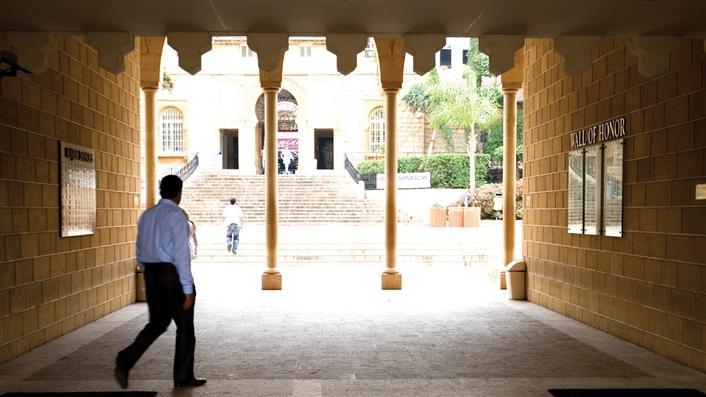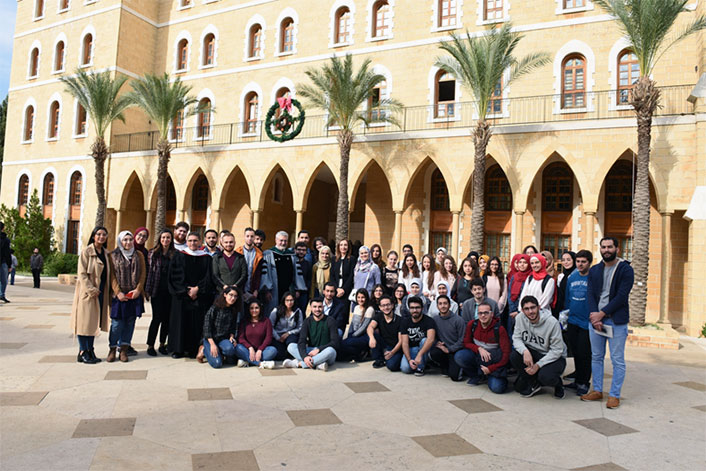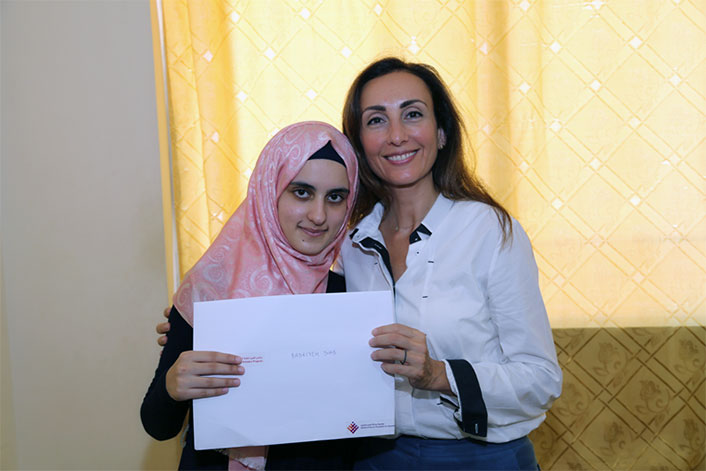The CEO of one of the largest privately funded philanthropic education initiatives in the Arab world talks about her work to support underserved youth by increasing access to quality education.

Maysa Jalbout is CEO of the Abdulla Al Ghurair Foundation for Education. Established in July 2015, the Foundation is one of the largest privately funded philanthropic education initiatives in the Arab world. Jalbout was previously CEO of the Queen Rania Foundation for Education and before that the head of Education Policy at the Canadian International Development Agency. As a nonresident fellow with the Center for Universal Education at the Brookings Institution, she focuses on four education research areas: refugee education, skills development, financing, and technology in education. She recently talked with EDUCAUSE President and CEO John O'Brien about her work and her hopes for the future.
John O'Brien: Who does the foundation serve, and how?
Maysa Jalbout: The Abdulla Al Ghurair Foundation for Education serves all young people in the United Arab Emirates (the Foundation's home country) and the Arab world (twenty-two states), especially those who are underserved and need additional support to complete their education. The Foundation is focused exclusively on increasing access to quality education in the region. Its programs include university scholarships at 16 universities in 10 countries, college and career-readiness guidance, and education innovation through open and online learning.
O'Brien: You work with those in desperate need. For those who have so little, how can technology innovation be a solution?
Jalbout: The Foundation prides itself on supporting those who are most in need—generally young people whose families have the lowest income levels in their respective countries. Today, 40 percent of our STEM scholarship recipients are the first in their family to enter university, 20 percent are refugees, and 40 percent are female (higher than the global average).
While I am very optimistic about the potential of technology in advancing our goals in education for the region, I think we are still at the beginning of this journey. Technology is not a panacea. The solutions targeting the young people we aim to reach have not been as effective as the promise.
We have, however, been able to use technology as an important tool to make the education opportunities we offer more accessible. For example, our applications are online and open to any young Arab. This direct online access has leveled the playing field for applicants, allowing them to compete on need and merit without third-party or bureaucratic processes. It has also helped us at the Foundation to learn much more about their challenges and to adapt our programs and processes to meet their needs more efficiently.
O'Brien: How are you using technology innovation to empower youth?
Jalbout: Our programs are built on the needs of, and feedback from, young people across the Arab region. We learned early not to chase the technology solutions that promise to solve everything. Thoughtful technology solutions and partners are key to designing tech-based education programs.
For example, we are working with Arizona State University (ASU) on delivering two of our programs using technology: Al Ghurair Young Thinkers Program; and Al Ghurair Open Learning Scholars Program. ASU has been working closely with us to address the specific needs of Arab youth and to meet our organizational goals, especially scaling.
The Young Thinkers Program uses gamification to introduce students to different careers in the job market based on their interests. Students can receive college and career coaching by chatting with expert success coaches while completing short courses that improve their soft skills such as time management and résumé writing. We have also developed a mobile application, available on the Apple Store and Google Play, that allows users to engage in the program on their portable devices. It offers something all Arab youth need, yet it is the first such program in the region, and the technology enables us to expand quickly.
The Open Learning Scholars Program gives Arab youth the opportunity to upgrade their academic qualifications and job skills through online degrees and credentials. With ASU, we are offering 550 fully online, accredited master's degrees in 28 specializations. Our plan is to expand our partners and offerings significantly in 2019.
O'Brien: Affluent countries are watching age-old models for higher education being called into question and are seeing colleges and universities close or restructure in painful ways. Is this disruption creating room for innovation and opportunities for organizations like yours to do some good?
Jalbout: Although these trends have not yet taken hold in the Arab world in the same way, we are proactively working to invest in innovations that will help students and higher education institutions better prepare for the future of education and jobs. The programs I mentioned above are part of the Foundation's early contribution to innovation in education in the region.
We are particularly proud of our support to the American University of Beirut and the American University of Cairo in their adoption of online learning. Through our collaboration with MIT, we invested in the capacity of these two universities to develop their first online degree courses. We have high hopes for both universities to be innovators in this space.

Still, we have a long way to go in the region. I am personally concerned about the low level of engagement among our regional universities on the big questions of our time—in particular, the massive disruptions and threats that technology can have on our lives.
O'Brien: What new models are you considering?
Jalbout: We are always thinking about how to better respond to the needs of our target youth. Most recently, we launched a special fund—the Abdulaziz Refugee Education Fund—to support refugee youth in Jordan, Lebanon, and the UAE. This fund is focused on finding the most innovative solutions (both low- and high-tech) to support funding of secondary education and vocational or higher education for the refugee population that is 14 years and older. The second round of funding applications opened in February 2019 for implementation in September 2019. More information will be shared through our social media channels.
O'Brien: If you could wave a magic wand and create the comprehensive dream partner, what would it look like?
Jalbout: The Foundation is committed to working with organizations that share our vision for education as the best way to improve the lives and prospects of young people everywhere. Our partners demonstrate a strong commitment to young people in the Arab region, have experience successfully serving the underserved, and deliver high-quality education. The ideal partner also pushes our thinking as an organization and brings new ideas to solve the challenges we aim to address.
O'Brien: Who inspires you?
Jalbout: I am very fortunate to find my inspiration in my job. I am most inspired by young people in this region, especially our scholars who have experienced hardships that would discourage most people. Their resilience, drive to succeed, and commitment to give back to their families and communities motivates me to strive to do more every day, for them and for many more we have not yet reached.
O'Brien: Raised voices and angry divisiveness seem to be an international phenomenon these days. What gives you hope?
Jalbout: I try to remain focused on results regardless of the sentiments of current international affairs. Results are what have kept me hopeful and persistent in my twenty-five-year career in this field—in Canada, in the Arab world, and even in conflict-affected countries. I have often met people who have gone to extreme lengths and sacrifices to survive, to help others, and to showcase the best of humanity.

Badriyeh Diab, a Palestinian refugee living in the Nahr El Bared refugee camp in Lebanon, is an example. Badriyeh is one of five children. Her parents are unemployed because they are not allowed to seek employment. Her life has been disrupted by conflict many times over. When I went to visit Badriyeh in her very modest family home inside the refugee camp in 2016, she told me that she had always clung to the dream of going to university. She did so through the toughest moments of her life, studying for exams even when she was living in a car garage after her family's house was destroyed. Several weeks ago, I visited Badriyeh (she is one of 87 Al Ghurair STEM Scholars [http://www.alghurairfoundation.org/en/content/stem-scholars] studying at the American University of Beirut). Her confidence and outstanding grades, as well as the fact that she is less than two years away from becoming an environmental engineer, give me immense hope.
This interview is the first in a series of 2019 articles featuring international educational organizations working to make a difference through scalable worldwide technology innovation. This series, edited by Hilary Baker and John O'Brien, coincides with the goals of the newly created EDUCAUSE International Task Force, which is seeking to better understand and increase engagement among the EDUCAUSE international community.
Maysa Jalbout is CEO of the Abdulla Al Ghurair Foundation for Education. John O'Brien is President and CEO of EDUCAUSE.
© 2019 Maysa Jalbout and John O'Brien
EDUCAUSE Review 54, no. 1 (Winter 2019)
